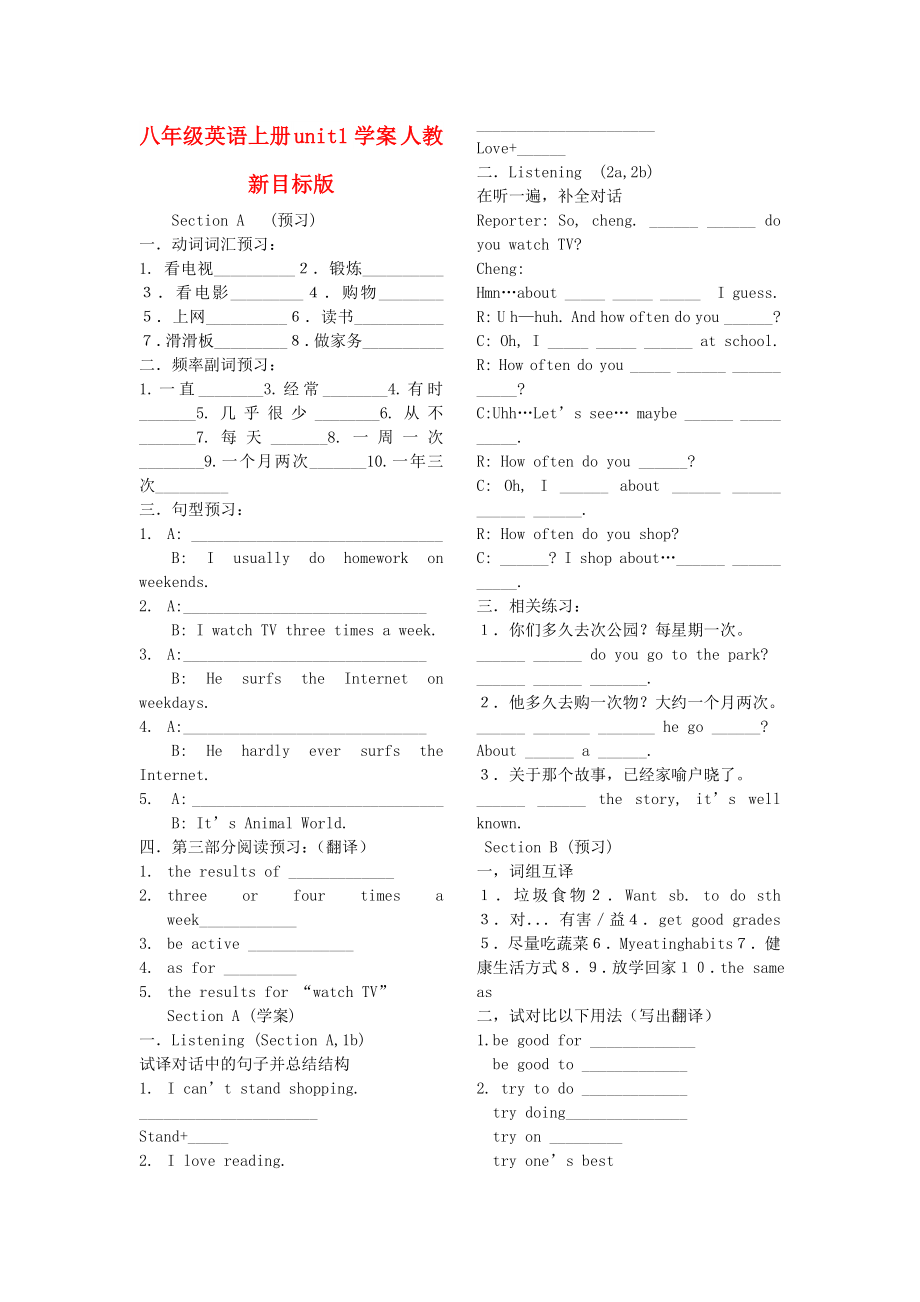《八年級(jí)英語上冊(cè) unit1學(xué)案 人教新目標(biāo)版》由會(huì)員分享�����,可在線閱讀��,更多相關(guān)《八年級(jí)英語上冊(cè) unit1學(xué)案 人教新目標(biāo)版(2頁珍藏版)》請(qǐng)?jiān)谘b配圖網(wǎng)上搜索���。
1���、八年級(jí)英語上冊(cè) unit1學(xué)案 人教新目標(biāo)版
Section A (預(yù)習(xí))
一. 動(dòng)詞詞匯預(yù)習(xí):
1. 看電視__________2.鍛煉__________3.看電影_________4.購物________5.上網(wǎng)__________6.讀書___________7.滑滑板_________8.做家務(wù)__________
二. 頻率副詞預(yù)習(xí):
1.一直________3.經(jīng)常________4.有時(shí)_______5.幾乎很少________6.從不_______7.每天_______8.一周一次________9.一個(gè)月兩次_______10.一年三次_________
三
2、. 句型預(yù)習(xí):
1. A: _______________________________
B: I usually do homework on weekends.
2. A:______________________________
B: I watch TV three times a week.
3. A:______________________________
B: He surfs the Internet on weekdays.
4. A:______________________________
B: He hardly ever surfs the
3���、Internet.
5. A: _______________________________
B: It’s Animal World.
四. 第三部分閱讀預(yù)習(xí):(翻譯)
1. the results of _____________
2. three or four times a week____________
3. be active _____________
4. as for _________
5. the results for “watch TV”
Section A (學(xué)案)
一. Listening (Section A,1b)
試譯對(duì)
4����、話中的句子并總結(jié)結(jié)構(gòu)
1. I can’t stand shopping.
______________________
Stand+_____
2. I love reading.
______________________
Love+______
二. Listening (2a,2b)
在聽一遍,補(bǔ)全對(duì)話
Reporter: So, cheng. ______ ______ do you watch TV?
Cheng:
Hmn…about _____ _____ _____ I guess.
R: U h—huh. And how often do you
5��、 ______?
C: Oh, I _____ _____ ______ at school.
R: How often do you _____ ______ ______ _____?
C:Uhh…Let’s see… maybe ______ _____ _____.
R: How often do you ______?
C: Oh, I ______ about ______ ______ ______ ______.
R: How often do you shop?
C: ______? I shop about…______ ______ _____.
三.
6�����、相關(guān)練習(xí):
1. 你們多久去次公園���?每星期一次。
______ ______ do you go to the park?
______ ______ _______.
2. 他多久去購一次物�?大約一個(gè)月兩次。
______ _______ _______ he go ______?
About ______ a ______.
3. 關(guān)于那個(gè)故事�����,已經(jīng)家喻戶曉了�����。
______ ______ the story, it’s well known.
Section B (預(yù)習(xí))
一����, 詞組互譯
1.垃圾食物2.Want sb. to do sth3.對(duì)...有害/益4.
7�、get good grades5.盡量吃蔬菜6.My eating habits 7.健康生活方式8.9.放學(xué)回家10.the same as
二�����, 試對(duì)比以下用法(寫出翻譯)
1.be good for _____________
be good to _____________
2. try to do _____________
try doing_______________
try on _________
try one’s best
3.health______healthy_______ unhealthy_____healthily
4. differen
8�����、t ________difference_______
5. look after (well)__________
take good care of __________
6. little 比較級(jí) ________ 最高級(jí)________
good比較級(jí)________最高級(jí)________
although= _________
7. keep +doing _________
keep +形容詞
Section B (學(xué)案)
一. Listening (2a,2b)
If you are a doctor, can you give Bill some goo
9�����、d advice to make him healthier, Bill should
A:____________________________
B:____________________________
C:_____________________________
D:_____________________________
E:_____________________________
三���, Reading (3a)
After reading, plete the translation below.
1. 多讀書對(duì)我們有好處�����。
It ______ ____
10���、__ ______ us to do more reading.
2. 多吃蔬菜能幫你保持身體健康。
______ a lot of vegetables can help you to ______ ______ ______ _______.
3. 你每天晚上睡多少個(gè)小時(shí)?我每晚睡八個(gè)小時(shí)�。
_______ ______ _______ do you sleep every night?
I sleep _____ eight ______ every night.
4. 我的健康生活方式能幫我取得好成績(jī)。My ______ ______ helps me ______ good grades.
5. 你必須盡量少吃肉�����。
You must ______ _______ eat ______ meat.
5. 老師不想讓我們遲到���。
Teachers don’t _______ ______ ______ _____ late for school.
 八年級(jí)英語上冊(cè) unit1學(xué)案 人教新目標(biāo)版
八年級(jí)英語上冊(cè) unit1學(xué)案 人教新目標(biāo)版

